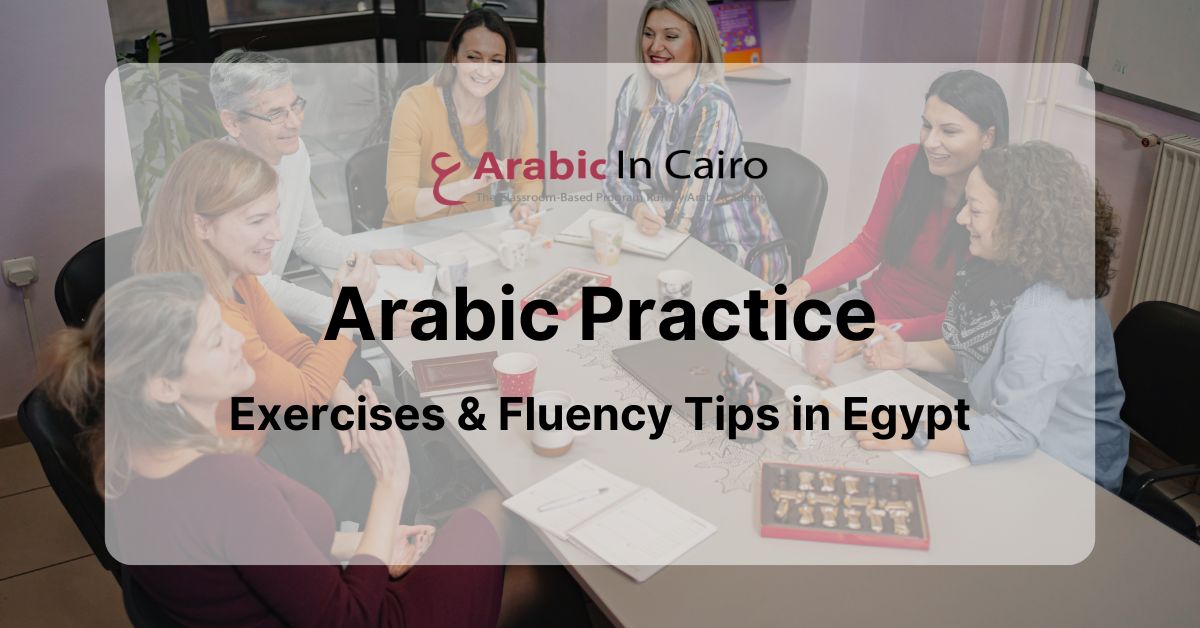Choosing the Right Arabic Language Institute in Cairo and Beyond: What You Need to Know
If you’re comparing options for an Arabic language institute in Cairo, you’re not just picking a school, you’re choosing a lifestyle for the months ahead. The right choice will match how you learn (intensive or flexible), what you need (Modern Standard Arabic vs. Egyptian Colloquial), and how deeply you want to immerse in Cairo’s everyday Arabic. Below is a practical, research-driven guide shaped by real student stories and outcomes from Arabic in Cairo, plus a clear checklist to help you decide with confidence.
Why Cairo and what really matters when you compare Arabic institutes in egypt
Cairo gives you what a textbook can’t: daily practice with friendly locals, a dialect that’s widely understood across the Arab world, and a city where your language skills level up every time you order coffee or haggle for a taxi. When evaluating Arabic institutes in egypt, look for three anchors:
- A clear curriculum path (from absolute beginner to advanced) with level placement before you arrive.
- Multiple study tracks (full-time, half-time, private) to fit your schedule.
- Meaningful immersion provides structured ways to practice outside the classroom without feeling lost.
arabic language institute cairo: a quick checklist
- Study tracks & hours: Confirm weekly hours and pacing (e.g., full-time ≈ 20 hours/week, half-time ≈ 10 hours/week) and check how often new classes start.
- MSA + Egyptian Arabic: Prioritise programs that pair Modern Standard Arabic with Egyptian Colloquial so you can read the news and survive the microbus.
- Placement & progress: Look for a free placement test (online before arrival or in-person), regular assessments, and feedback you can act on.
- Blended learning: Ask if you’ll get access to an online platform alongside in-person classes, useful for review and speaking drills.
- Immersion design: Look for conversation clubs, teacher-led outings, and guided tasks with locals.
- Support & safety: Airport pickup, housing tips, and responsive admin teams make a huge difference in week one.
What the top programs have in common (and how Arabic in Cairo stands out)
Across leading schools, you’ll see recurring strengths: scaffolded curricula, qualified teachers, and a blend of MSA and Egyptian Arabic. Arabic in Cairo (Arab Academy) adds three differentiators that students consistently mention:
- Monthly intakes & flexible hours: Full-time, half-time, and private lessons that can start quickly, so momentum never stalls.
- Online + in-person synergy: Structured online materials to reinforce classwork, making self-study efficient.
- Immersion with purpose: City-based activities that turn Cairo into your practice field without throwing you in the deep end.
Case studies: what success looks like in Cairo
- From zero to real conversations: Learners who arrive as beginners leave holding everyday conversations and navigating life solo, ordering food, directions, errands, because practice is baked into the program design.
- Professionals on a deadline: Diplomats and business travellers use targeted tracks (e.g., media or business Arabic) to get operational fast.
- Institutions that trust the model: International schools and universities partner for customised programs, a useful quality signal if you value academic rigour.
Comparing formats: intensive, part-time, or private?
- Intensive (best for momentum): Ideal if you can commit to 4–5 days per week and want fast, measurable gains.
- Part-time (best for balance): Fewer weekly hours keep your learning consistent while you work or study.
- Private lessons (best for focus): Tailored gaps-first teaching and schedule flexibility are great for pronunciation tuning or exam prep.
MSA vs. Egyptian Colloquial: your combo plan
Think of MSA as your reading and formal-speech engine, and Egyptian Colloquial as your life-skills kit. A strong Arabic language institute will help you combine both from day one so you don’t become fluent only on paper or only on the street.
Location matters: searching “Arabic institute near me” the smart way
When you type Arabic institute near me or Arabic institute near me Cairo, map pins won’t tell you about pedagogy or support. Shortlist schools by teaching model first; then compare commute, neighbourhood vibe, and safety. A 10-minute walk can be the difference between showing up energised vs. skipping evening practice because traffic wins.
Budgeting and value among Arabic institutes in Cairo
Cairo offers a rare combo of quality instruction and accessible living costs compared to North America or Europe; many students find they can learn more while spending less by studying here. When you evaluate Arabic institutes in egypt, Cairo, calculate the value per learning hour and consider what’s bundled (placement test, materials, online access, conversation clubs). The goal isn’t “cheapest”, it’s sustained progress per week.
How Arabic in Cairo structures progress (and why it works)
Programs start frequently, use placement to set your level, and reinforce classwork through online modules and real-life tasks. The rhythm classroom → practice → feedback keeps you moving. Students highlight supportive teachers who challenge you without overwhelming you, and a culture of encouragement that makes sticking with Arabic feel genuinely rewarding.
Your next step
If you’re ready to move beyond browsing and into speaking, Cairo is waiting. Choose the track that fits your life, then let the city do the rest.
Start with a quick placement and get your study plan. Book your spot at Arabic in Cairo today.
FAQs
How many hours per week should I study?
If you want fast progress, go intensive (full-time). If you’re working or studying, part-time keeps momentum while protecting your schedule.
Do I study MSA or Egyptian Arabic?
Both. MSA builds reading and formal speaking; Egyptian Arabic powers daily conversation. Combine them from the start.
Can I mix online and in-person?
Yes, blended learning helps you review and practice speaking even on days you’re not in class.
When do new classes start?
Frequently throughout the year. Join the next intake after your placement, or begin private lessons sooner.
Is Cairo affordable for international students?
Generally, yes, compared to many global cities. Budget for tuition, housing, and transport and prioritise schools that maximise practice per hour.







